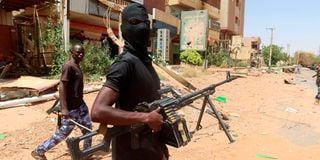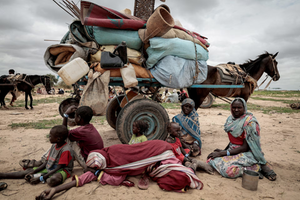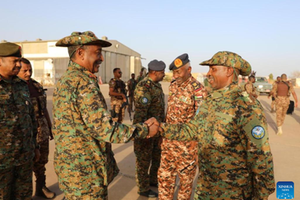
Members of Sudanese Armed Forces look on as they hold weapons in the street in Omdurman, Sudan on March 9, 2024. PHOTO | REUTERS
Sudan’s warring factions will, on April 15, clock a year of fighting and killing civilians, in spite of widespread warnings that war crimes were being committed in the country.
And now it seems the warring sides, the Sudan Armed Forces (Saf) and Rapid Support Forces (RSF), find those atrocities useful to advance their quest for power, according to experts who have analysed the war for the past year.
For most of that time, Human Rights Watch, Amnesty International and even the US State Department have declared they had found evidence of war crimes. But in that time, the victims of killings, displacements, economic sabotage and starvation, have been largely faceless. Until March when one of the aid workers spoke of feeling its pinch.
Sudan Country Director for the Islamic Relief Elsadig Elnour said his family members in Khartoum were unable to buy food for days due to the blackout.
A family member in El Obeid, North Kordofan, was killed by stray bullets a few days earlier. In both occasions, his communication to them was limited and he could only send condolences five days later.
“After more than 10 months of war, lives of millions of people hang by a thread and now their only lifeline is also at risk,” he spoke last week.
“My relative was killed during the outage and I have only today been able to send my message of condolence and support to that area. Elements in the conflict have also used the outage to attack villages in Al Jazirah State and likely beyond with the population unable to call for help. They are taking advantage of the lack of communication.”
In Sudan, the pattern has been such that warring factions cut telecommunication and power between towns, then launch attacks on those who do not support their cause. In other cases, aid delivery has been blocked to areas perceived to be enemy territory. Food is given to those who support the cause or looted from those deemed opposed to it.
When telecommunication infrastructure was destroyed in February, RSF and Saf traded blame. But the civilians couldn’t transact at banks, couldn’t buy food nor communicate with aid agencies to coordinate aid delivery.
The worst hit states are Khartoum, Darfur, parts of Kordofan, Sennar, Al Jazirah, White Nile and Blue Nile, according to an assessment by the Islamic Relief.
Power blackouts are potentially life-threatening for many of the poorest communities. For example, communal kitchens, a virtual arrangement between relief agencies to provide food in Khartoum and Omdurman, have had to close, as they can no longer receive money transfers – leaving many poor families without access to food.
Same players, familiar faces
The International Rescue Committee (IRC), another aid agency, said this week that the war, coupled with disrupted supply chains, economic decline, and hindrances to humanitarian aid, has meant some 18 million people have plunged into “into severe levels of acute food insecurity.
“A hunger crisis of unimaginable proportions is not a future concern, but a present reality in certain parts of the country,” IRC said of Sudan, where more than 730,000 children suffering from severe malnutrition.
Last week, the Famine Early Warning Systems Network warned of a risk of famine in parts of Sudan, including West Darfur, Khartoum, and areas in Greater Darfur. And the IRC says a spike of up to 175 percent in malnutrition was observed in children under five years.
More than 15,000 people have died from direct violence or indirect effects of it. Another 10 million are displaced internally and more than two million forced out of the country as refugees.
Those who remain have become pawns in the war game. One assessment by Amnesty International said both sides have toyed with civilians.
It said the Saf has been directing humanitarian agencies not to supply aid to areas perceived to be RSF-friendly. The RSF, on the other hand, have looted warehouses or diverted aid from the needy people it was meant for. They have also cut communication to disrupt coordination.
“They are using internet shutdown as an instrument of war. They want to win the war by all means. But this should not be the case because parties to the conflict are required to protect civilians,” a senior official at Amnesty International told The EastAfrican on Thursday.
Sudan’s atrocities aren’t unique. Killings and disregard for civilian safety have been common in Gaza, Ukraine, South Sudan and Ethiopia, where there have been wars in recent times.
According to Amnesty International, however, Sudan’s warring figures of the past are also today’s, creating a dangerous state of impunity.
For example, when the civil war erupted in Darfur in early 2000s, senior figures of Saf and the Janjaweed, the precursor of RSF, were indicted by the International Criminal Court (ICC). But the Court was unable to try them.
“The same players of the violence 20 years ago are still at play today. We believe impunity is the most underlying causes of the Sudan conflict. First they colluded to overthrow the civilian government. Now they know they can kill as many people as they want and nothing will happen to them,” the Amnesty official explained.
The warring factions know the atrocities can help win the war and banish their rivals from power.
The situation is complex, argued Dr Jihad Mashamoun, an expert on Sudan, and honorary research fellow at the Institute of Arabic and Islamic Studies at the University of Exeter, UK.
“RSF are not a professional army; there are reports of their attacks and looting of banks, civil properties, homes, smuggling loot into Chad, Niger, etc, and placing themselves and weapons in civilian areas to avoid attacks from the Saf,” he told The EastAfrican.
“From the Saf that represents the state, its attacks on dense civilian areas are a result, in the early months of war, of using conventional fighting tactics against unconventional warfare by the RSF. Hence, they used planes and artillery against the RSF locations who hide in civilian homes, hospitals and civil institutions.”
Those tactics changed and Saf adopted use of Special Forces and drones to carry out more precise attacks to minimise civilian casualties. Over time, both sides have been accused of blocking aid, use of child soldiers or importing weapons under the guise of humanitarian deliveries, or simply diverting aid from civilians perceived unsupportive.
“The RSF use it to force Gen Abdel Fattah al-Burhan and his allies to sit down for a political settlement to allow Gen Hemedti and the RSF to be part of a transition government,” Dr Mashamoun said about the general strategy by warring factions to weaken each other.
“For Burhan and his allies, it gives them more reason not to seek political settlement with the RSF,” he said referring to Sudan’s junta leader al-Burhan.
That is because Burhan and his senior officers have been forced by middle ranking officers, soldiers and allies of the former regime in the Saf to change tack from defence to attack.
“This encourages Burhan and his allies continue to pursue a military solution first, and a political one to be reached afterwards. That means both sides want a political settlement, but on their own terms through these leverages.”
The quest to cancelling out each other means war can’t stop yet.
One poignant problem has been that warring sides have been able to import weapons, especially via the Gulf countries undeterred, in spite of sanctions on senior leaders of both sides. Amnesty said it was lobbying the UN Security Council to expand the arms embargo imposed on Darfur to the entire Sudan, then call on the international community to implement it.


